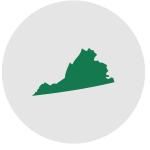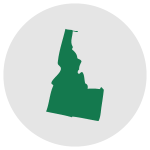Individualized Education Program (IEP)
Just as no two students are alike, neither are their strengths and educational needs. This is particularly true for students with disabilities, who may require unique resources and approaches to support their educational experiences and their transitions into the workforce. An Individualized Education Program (IEP) is designed to meet the individual needs of a student with disabilities. IEPs set reasonable learning goals and state the special education and related services the school district will provide for a child with a disability, which is required by law. The COVID-19 pandemic forced states and schools to think creatively about how to conduct IEP meetings, what to revise within the IEPs regarding service delivery and how to continue providing students with the individualized services and supports they need.
IEPs are developed to use student strengths to best access an appropriate education. IEPs are developed or revised annually for students with disabilities, and they are carried out by an IEP team composed of teachers, school administrators, family members, the student and those who are responsible for providing and/or paying for transition services in accordance with the Individuals with Disabilities Education Act (IDEA). IEPs are required to include information such as academic and functional goals for the student, how progress toward those goals will be measured, the special education and related services (including secondary transition services) that will be provided and a description of necessary accommodations.
Offering recommendations and guidelines for hosting virtual IEP meetings

The Oklahoma Department of Education created a virtual IEP meeting checklist to set meetings up for success. The checklist includes items such as engaging family members, determining the best web platform to use, identifying possible barriers, engaging service providers and obtaining virtual signatures.

The Virginia Department of Education shared a tip sheet for hosting virtual IEP meetings. The tip sheet includes information for hosts and participants of the meetings, as well as technology suggestions.
Providing tele-facilitation services, to improve communication during virtual IEPs

The Colorado Department of Education offers IEP facilitation, which is an option for using an impartial third party to promote effective communication throughout the IEP process. During the COVID-19 pandemic, Colorado continues to provide this service through a tele-facilitation model. This web page includes meeting guidelines for the tele-facilitated model.

New Jersey also provides IEP facilitation services at no cost to schools or families and is offering these services remotely during COVID-19, employing whichever online platform the school district prefers.
Providing guidance and resources for updating and supplementing IEPs, to account for limitations imposed by COVID-19

The Washington Office of Superintendent of Public Instruction created a Continuous Learning Plan template for schools. The purpose is to support individualized student planning for the delivery of special education and related services through continuous learning and instruction during school facility closure. The Continuous Learning Plan is not intended to replace a student’s IEP, but rather to strengthen the IEP by documenting individual decisions for special education services during school facility closure. Additionally, the state provided an implementation guide for the Continuous Learning Plan.

The Idaho Department of Education hosted a series of webinars by special education directors to provide guidance on the provision of special education services during COVID-19-related closures. These webinars covered a variety of topics, including continuation of IEP planning.
General Resources
Question and Answer (Q&A) Document: The U.S. Department of Education released a question and answer document regarding the implementation of the Individuals with Disabilities Education Act (IDEA) Part B dispute resolution procedures during the COVID-19 pandemic.
The Short and Sweet IEP Overview: This overview addresses the purpose, development and timeline of the IEP. It also discusses student involvement in the process and provides additional resources.
Virtual IEP Meeting Tip Sheets: These virtual IEP meeting tip sheets cover a variety of topics including technology, common questions and answers for hosting or participating, as well as tips for success before, during and after a meeting.
Continuity of Learning During COVID-19: The Department of Education’s IDEAs That Work website offers information, tools and resources to help educators, parents and families and related service providers meet the educational, behavioral and emotional needs of children and youth with disabilities through remote and virtual learning. In addition, users will find several information briefs on evidence-based and promising practices designed to support continuity of learning for students with disabilities. Viewers also have access to a searchable database containing resources and information for educators, parents and families and related service providers to support students with disabilities.
Alternate View
Alabama
Special Education Services (SES) Covid -19 Q&A
Special Education, 504 and More, Oh My!
COVID-19 Considerations for Special Educators
COVD-19 Questions
COVID-19 Questions Revised
Alaska
Special Education – Frequently Asked Questions
Alaska Special Education Covid 19 District Guidance
Special Education FAQ
Special Education (SPED) webinars
Alaska Smart Start 2020
Arizona
COVID-19 Special Education Q & A
Special Education Guidance for COVID-19: SY 2020—2021 School Reentry
Arkansas
Guidance for Special Education for Extended AMI
Guidance for Special Education for Extended AMI
Special Education Guidance for COVID-19
Sample Remote Learning Plan
Special Education Reentry Guidance
Ready for Learning and Re-entry
California
CDE Distance Learning Webinar Series
COVID-19 School Closures and Services to Students with Disabilities
Special Education Guidance for COVID-19
Colorado
Learning Supports for Students with Disabilities
State and Federal Special Education COVID-19 Guidance
Special Education & COVID-19 FAQs
IEP Tele-Facilitation
Indicator 13: Transition IEP Record Reviews, Data Collection Process,
and Levels of CDE Support – Overview and What’s New SY2020-2021
Enrich System Features for Educators and Administrators During COVID-19
Tele-Facilitation within Alternative Dispute Resolution
Parent/Family Frequently AsÅed Questions
Connecticut
Reopening Guidance for Educating Students with Disabilities
Continued Educational Opportunities and Special Education During the COVID-19 Pandemic
Fall Reopening Resource Document for Students with High Needs
Guidance for Extended School Year (ESY) Services during the COVID-19 Pandemic
Special Education Guidance for Parents Related to School Reopening
Guidance for IEP Progress Reporting during the COVID-19 Pandemic
Delaware
School Closure FAQs
Further Guidance Related to COVID-19: IDEA, Part B Provision of FAPE
A Successful Launch of the 2020-2021 School Year: Recovery Efforts and the Provision of FAPE for Students with Disabilities during the Re-Opening of Schools from Covid-19
Least Restrictive Environment in the Wake of COVID-19: A Brief from the Association of State Directors of Special Education
Returning To School: Planning a Safe, Efficient, and Equitable Return to School for Students and Staff
District of Columbia
IDEA, Part B Provision of FAPE: Guidance Related to Remote and Blended Learning
Serving Students with Disabilities during Periods of Remote or Blended Learning
Reopen Strong: Specialized Education Services
Florida
BEESS COVID-19 Updates
State of Florida Department of Education Emergency Order
Georgia
Special Education Services Family Communication Document
Guidance on Restart and Implementation for the Individuals with Disabilities Education Act (IDEA)
Guidance on Restart and Individuals with Disabilities Education Act (IDEA) Timelines
Special Education Technical Assistance COVID-19 School Closures
Resources for Distance/Remote Learning
Georgia Academy for the Blind Reopening Plan
Restart Guidance on “Change of Placement” versus “Change of Location”
Compensatory Services Determination Process
Reopening Checklist for Special Education
Best Practice Guidance for Support Personnel
Quick Tips for a Successful Virtual IEP Team Meeting
Virtual Individualized Education Program (IEP) Team Meeting Checklist
Tips for Parents Attending Virtual IEP Meetings
Hawaii
Special Populations Helpful Links
Equity and Access: Supports for Vulnerable Students
SPED: Reopening Schools – Students with Disabilities Return to Learn
Idaho
Webinars and Updates: Special Education
COVID-19 FAQs For Families and Parents of Students with Disabilities
Guidelines for Providing Special Education Services During the COVID-19 Pandemic
Special Education Resources
Guidelines for Providing Special Education Services During the COVID-19 Pandemic
Special Education Guidance for Back-To-School
Medicaid School-Based Services Guidance for Back-to School 2020
Special Education Students ISEE Quick Guide: COVID-19
Transportation Quick Guide: COVID-19
Illinois
Frequently Asked Questions for Parents of Students with Disabilities
Regarding School Year 2020-21
Frequently Asked Questions for Special Education During Remote Learning
ISBE Special Education Guidance
FAQ for Special Education During Remote Learning
Frequently Asked Questions for Special Education on the Transition to In-Person Instruction
Starting the 2020-21 School Year
Indiana
Continuous Learning and Accommodations
Resources to Assist with the Delivery of Services to Students with Disabilities
Office of Special Education COVID-19 Resources & Information
Resources to Assist with the Delivery of Services
to Students with Disabilities
Indiana’s Considerations for Learning and Safe Schools In-Class Health and Safety Re-entry Guidance
Due Process Hearings During COVID-19
Contingency Planning Considerations for Students with Disabilities in the Current COVID-19 Environment
Planning for Returning to School: Resources for Educators
Office of Special Education COVID-19 Resources and Information
Iowa
COVID-19 Recovery Services for Learners Receiving IDEA Services Frequently Asked Questions (FAQ)
Placement Decisions During COVID-19 Pandemic
Return-to-Learn Special Education
Continuous Learning Frequently Asked Questions
COVID-19 Recovery Services for Learners Receiving IDEA Services Frequently Asked Questions (FAQ)
Kansas
Documenting Frequency, Location, and Duration of Accommodations and Modifications on the IEP
School Year 2020-21 Compliance with the Individuals with Disabilities Education Act and the Kansas Special Education for Exceptional Children Act for Reopening Schools during the COVID-19 Pandemic
Navigating Change: Kansas’ Guide to Learning and School Safety Operations
Navigating Next
Kentucky
Letter Regarding IEP Services to Children with Disabilities During the COVID-19 Pandemic
Updated Covid-19: Answers to FAQs for Kentucky’s Schools and Districts
Q&A for Parents of Children with Disabilities
COVID-19 Resources for Special Education and Early Learning
KDE COVID-19 Guidance 2.0
Louisiana
Louisiana Department of Education COVID-19
Start Strong 2020
Continuous Education for Students with Disabilities: Direct Services
Maine
Office of Special Services COVID-19 Communication
Continuity of Learning and Special Education During COVID-19
Special Services Virtual Meeting Archives
Maryland
Serving Children with Disabilities Under IDEA During School Closures Due to the COVID-19 Pandemic
Providing Continuity of Learning to Students with Disabilities Through Nonpublic Special Education Schools during COVID-19
COVID 19 – Continuity of Learning for Maryland Schools
Maryland Together: Maryland’s Recovery Plan for Education
Resources for Educators and Families
Massachusetts
Letter for Families of Students with Disabilities
Initial Fall School Reopening Guidance
Comprehensive Special Education Guidance for the 2020-21 School Year
Guidance about Summer 2020 Special Education Services
Michigan
Guidance to Address Return to Learn for Students with IEPs
Guidance for Compliance with the Individuals with Disabilities Education Act and the Michigan Administrative Rules for Special Education During the COVID-19 Pandemic
Guidance to Address Foregone Learning for Students with IEPs as a Result of the COVID19 Pandemic
MI Safe Schools: Michigan’s 2020-21 Return to School Roadmap
Supporting Students with Disabilities in K-12 Online and Blended Learning
Comparison of Compensatory Education and Recovery Services Due to COVID-19
Compliance Requirements of the Individuals with Disabilities Education Act (IDEA) and Michigan Administrative Rules for Special Education (MARSE) during a Public Health Emergency
Minnesota
Special Education and COVID-19 Questions and Answers: Due Process
Q & A In-Person Instruction and Services Provided by School Staff
to Students with Disabilities
Q & A: Determining In-School In-Person Services and In-Home In-Person Services for Students with Disabilities
Fall Guidance 2020-21: Special Education Due Process
Compensatory Services Q and A: Related to COVID-19 and school closures and distance learning through the 2019-20 school year
Special Education and COVID-19 Questions and Answers: Special Education Instruction, Services, Programming, Funding and Resources
2020-21 Planning Guidance for Minnesota Public Schools
Guide to Addressing the Impact of the COVID-19 Pandemic on
Students with Disabilities
Frequently Asked Questions about the Guide to Addressing the Impact of the COVID-19 Pandemic on Students with Disabilities
Missouri
DESE Office of Special Education Compliance COVID-19 Related School Reopening and Distance Learning Question and Answer Guide
Implementation guidance for alternative methods of instruction (AMI) days for students with disabilities
Pandemic Recovery Considerations: Re-Entry and Reopening Schools
COVID-19 and Summer School 2020 Questions and Answers for Local Education Agencies
Montana
Re-Opening Montana’s Schools 2020 COVID-19 Special Education Information
Pivot Plan
OPI Special Education Trainings
Nebraska
Q and A for Providing Special Education and Early Intervention During Coronavirus School Closure
Learning Guidance for Students with Disabilities For Summer Learning and Beyond
Questions and Answers on Providing Services to Children with Disabilities During the Coronavirus Disease 2019 Outbreak
Coronavirus FAQ
Questions and Answers for K-12 Public Schools In the Current COVID-19 Environment
Q&A Nebraska Office of Special Education
Special Education Services during the Coronavirus School Closures Clarification
Letter to Families and Parents of Students with Disabilities
Nevada
Nevada’s Path Forward: A Framework for a Safe, Efficient, and Equitable Return to School Buildings
COVID-19 and Students with Disabilities
New Hampshire
New Hampshire Grades K-12 Back-to-School Guidance
Guidance Document Archive
New Jersey
The Road Back: Restart and Recovery Plan for Education
New Jersey Specific Guidance for Schools and Districts
Guidance on the Delivery of Extended School Year (ESY) Services to Students with Disabilities – June 2020
School Reopening Frequently Asked Questions
New York
Recovering, Rebuilding, and Renewing: The Spirit of New York’s Schools Reopening Guide
Memo: Emergency Regulations for the Provision of Special Education Programs and Services and Due Process Procedures in Response to the Novel Coronavirus (COVID-19) Outbreak in New York State
Provision of Services to Children with Disabilities During Statewide School Closures Due to Novel Coronavirus (COVID-19) Outbreak in New York State
Supplement #1 – Provision of Services to Students with Disabilities During Statewide School Closures Due To Novel Coronavirus (COVID-19) Outbreak in New York State
Supplement #2 – Provision of Services to Students with Disabilities During Statewide School Closures Due To Novel Coronavirus (COVID-19) Outbreak in New York State
Supplement #3 – Provision of Services to Students with Disabilities During Statewide School Closures Due To Novel Coronavirus (COVID-19) Outbreak in New York State
Frequently Asked Questions and Answers Regarding the Provision of
Services to Students with Disabilities During the 2020-21 School Year
Handbook for Summer School Administrators and Principals (2020)
North Carolina
Official Lighting Our Way Forward: North Carolina’s Guidebook for Reopening Public Schools
Special Education Remote Instruction Practice Guide
North Dakota
Guidance on Providing Services to Children with Disabilities During the Coronavirus Outbreak
Frequently Asked Questions
COVID-19 Special Education
COVID-19 Equitable Online Learning through the Lens of Student Needs
COVID Compensatory Services Information Paper
Ohio
Additional Considerations for Special Education
Considerations for Students with Disabilities During Ohio’s Ordered School-Building Closure
Reset and Restart of the 2020-2021 School Year: Meeting the Needs of Students Who Receive Special Education Services in K-12
Students with Disabilities Compendium of Resources
Remote Learning for Students with Disabilities Who Have Complex Needs
Students with Disabilities Guidance
Oklahoma
Planning for Virtual or Distance Learning Services and Developing a Contingency Plan in OK ED Plan
Special Education and Related Services During the 2020-21 School Year
Coronavirus/ COVID19 FAQs for Oklahoma Public Schools
Distance Learning Guidance for Special Education
Coronavirus/COVID-19 FAQs for Families and Parents of Students with Disabilities
Parent Engagement: Distance Learning for Students with Disabilities
Parent Tips for Virtual IEP Meetings
Special Education IDEA FAQs During COVID-19 Pandemic
Extended School Year Services (ESY) During the COVID-19 Pandemic
Special Education: Other Resources
FAQ: Providing a Free Appropriate Public Education (FAPE) Through a Distance Learning Platform During a Closure to Normal School Operations due to the COVID-19 Pandemic.
Alternative Dispute Resolution Guidance Related to COVID-19
Oregon
Ensuring Equity and Access Aligning State and Federal Requirements
Guidance for Special Education Evaluation During COVID-19
Comprehensive Distance Learning
New Guidance for Limited In-Person Instruction During Comprehensive Distance Learning
Pennsylvania
Pennsylvania Department of Education, Bureau of Special Education:
Answers to FAQs Regarding the COVID-19 Pandemic
Guidance and Answers to FAQs on COVID-19 Compensatory Services
Students With IEPs and the 2020-21 School Year
Answers to FAQs Regarding the COVID-19 Pandemic
Puerto Rico
Plan de Contingencia y Proteccion Para Los Maestros, Asistentes, y Estudiantes de la SEcretaria Asociada de Educacion Especial Ante el COVID-19
Autorizacion De Reuniones de COMPRU en Linea Durante el Periodo de la Emergencia del COVID-19
Rhode Island
Back to School RI: Reopening Frequently Asked Questions SY20-21
South Carolina
Accelerate ED Task Force Guidance and Recommendations for 2020-21 School Year
Virtual SC and Students with IEPs
Accelerated Task Force
Navigating COVID #1
Tennessee
School Closures and Special Education: Guidance on Services to Students with Disabilities
Special Education Related FAQ
School Reopening Toolkit: Special Populations
Special Education and COVID-19
Special Populations Reopening FAQ
Texas
COVID-19 Support: Special Education
TEA Guidance: Compensatory Services – Summer of 2020
Vermont
Special Education Guidance
FAQ: Clarification of Assessing COVID-19 Impact Guidance
Virginia
VDOE Special Education and Student Services Frequently Asked Questions
Virtual IEP Meeting Tip Sheets
What Families of Students with Disabilities Need to Know During COVID-19 School Closure
VDOE Considerations for COVID Recovery Services for Students with Disabilities
Special Education Students After COVID-19 Key Considerations
Washington
Professional Development Opportunities for Supporting Students with Disabilities
Special Education Planning Guide for Reopening Washington Schools 2020
Reopening WashingtonSchools 2020: Special Education Guidance
Guidance for Families on Special Education Services During COVID-19
Questions and Answers:Provision of Services to Students with Disabilities During School Facility Closures for COVID-19
Continuous Learning Plan
Questions and Answers: Provision of Services to Students with Disabilities
During COVID-19 in Fall 2020
Special Education Reopening Guidance: Least Restrictive
Environment (LRE) Case Studies
Special Education Guidance Brief for In-Person Learning: Spring 2021
West Virginia
West Virginia Remote Learning Framework for the COVID-19 Emergency
Re-entry Guidance for the Education of Students with Exceptionalities
Providing a Free Appropriate Public Education (FAPE) during School Closure Due to the COVID-19 Pandemic through Distance Learning, Frequently Asked Questions
Supporting Continuity of Teaching and Learning for Students with Disabilities During an Extended School Closure
COVID-19 Recovery Services vs Compensatory Services
Wisconsin
What Families Need to Know about Additional Services Due to Extended School Closure
Extended School Closure due to COVID-19 Special Education Question and Answer Document
COVID-19 Special Education Question and Answer Document
Teleservice Considerations for Related Services During the Current Public Health Emergency
Conducting Parent Friendly and Productive Virtual IEP Meetings
A Guide to Implementing IEPs and Monitoring Progress of IEP Goals When Moving Between In-Person, Hybrid, or Virtual Learning Environments
Information Update Bulletin 20.01
Virtual IEP Meeting Check List
Supplemental Resources for Supporting Students with IEPs During COVID-19
Wyoming
Wyoming Department of Education Special Education COVID-19 Update
Wyoming Coronavirus Letter to Families of Students with Disabilities
